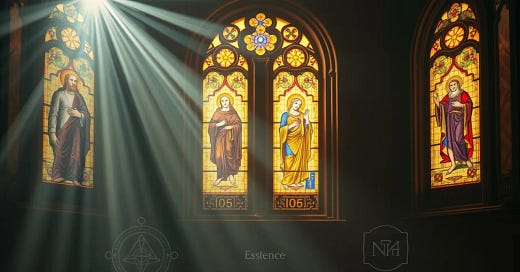Saying the Catholic Church needs Aristotelian metaphysics to explain the Eucharist is like saying music needs Newtonian physics to move your soul. It's a category mistake—as though mystery itself were shackled to a school of philosophy. While Aristotelian concepts like "substance" and "accidents" have played an indispensable role in the Church's articulation of transubstantiation, they are not the sole gatekeepers of Eucharistic reality. This article explores the philosophical scaffolding around the doctrine of the Real Presence and why that scaffolding, however helpful, is not the mystery itself.
I. Historical Context: Aristotle's Entrance into the Sanctuary
The use of Aristotelian categories in Catholic theology, particularly by Thomas Aquinas, marked a turning point in the Church's intellectual life. Drawing on the language of "substance" (what something is) and "accidents" (its sensible properties), Aquinas provided a framework to explain how the bread and wine can truly become the Body and Blood of Christ while still appearing unchanged.
This explanatory model reached its doctrinal climax at the Council of Trent (1545–1563), which declared that by the words of consecration, the substance of bread and wine becomes the substance of Christ's Body and Blood, even as the accidents (taste, color, smell, etc.) remain. This was not an endorsement of Aristotle per se, but an affirmation that Aristotelian categories best clarified the mystery at that time.
II. Theological Core: Mystery Over Metaphysics
It is crucial to note that the Church's dogma of transubstantiation does not declare that the Aristotelian model is the only metaphysically valid explanation—only that a real, substantial change occurs. The Catechism of the Catholic Church (CCC §1376) states:
"By the consecration the transubstantiation of the bread and wine into the Body and Blood of Christ is brought about."
The term transubstantiation points to a reality change, not a metaphysical loyalty. The Church is affirming that something essential changes at the level of being—not that only Aristotelian terms can articulate it. Indeed, Church Fathers like Ignatius of Antioch and Cyril of Jerusalem affirmed the Real Presence centuries before Aquinas or Aristotle's rediscovery.
III. Alternative Philosophical Lenses
If philosophy is the handmaid of theology, then metaphysical models are useful only insofar as they serve revealed truth. Other metaphysical frameworks, including Neoplatonism, Phenomenology, and even modern physics-inspired models like Personalist Thomism or Process Philosophy, offer alternative ways to describe real presence.
Neoplatonism might frame the Eucharist as a participation in the eternal Logos, with less concern for categorical substance.
Personalist Thomism could ground the Eucharistic presence in relational ontology: Christ becomes present not by local change, but by relational self-gift.
Process metaphysics might reinterpret presence as enduring relational actualization rather than static being.
None of these overturn the dogma—they simply express it differently. The reality remains; only the philosophical grammar varies.
IV. Analogy Revisited: Mystery and Music
Insisting that the Eucharist must be explained through Aristotelian metaphysics is like insisting that a symphony must be explained through Newtonian mechanics. Can physics describe the vibrations and waveforms of a song? Sure. But it cannot explain why your chest tightens, or your eyes well up, when the crescendo swells.
Likewise, Aristotelian metaphysics can help safeguard the truth of the Real Presence against materialist reductionism or symbolic misunderstandings. But it cannot exhaust the mystery. The Eucharist is not a puzzle to solve—it is a mystery to adore.
V. Conclusion: The Real Presence Transcends Categories
The Church has always held to the truth of the Real Presence, not the mode by which that truth must be philosophically explained. Aristotelian metaphysics has served the Church well—but it is not the source of Eucharistic reality. That source is Christ's word: "This is My Body." Not a hypothesis. Not a metaphor. A revealed fact.
Philosophy bends the knee here. Whether we use Aristotle, Plato, quantum mechanics, or none of the above, the truth remains: the Word made flesh makes Himself our food. And no human category can fully contain Him.



Amen!